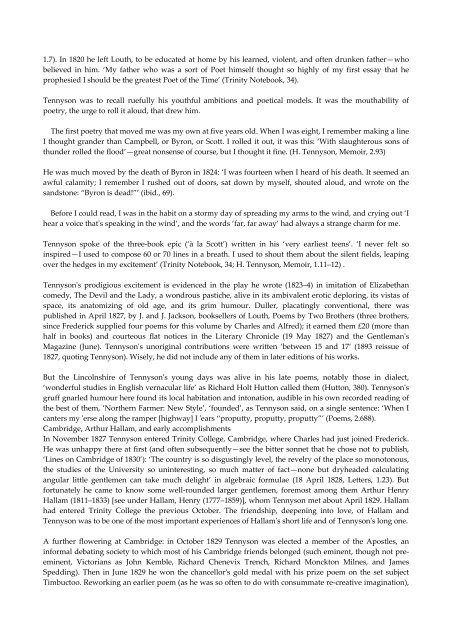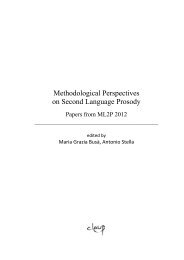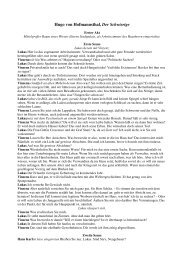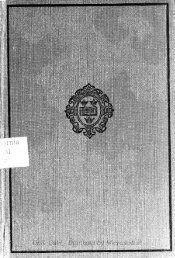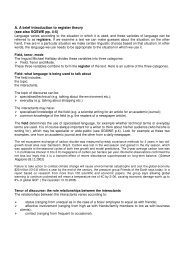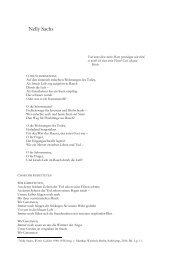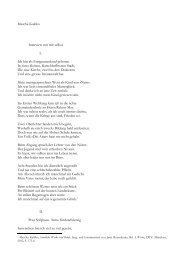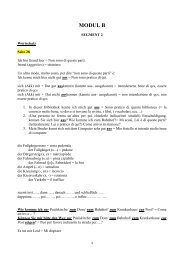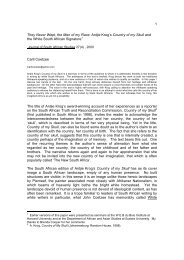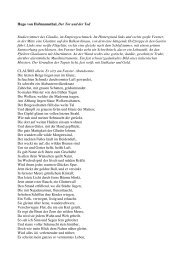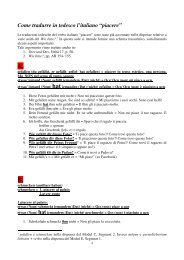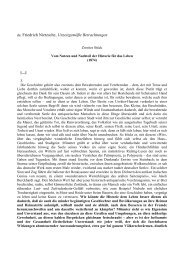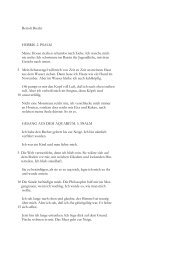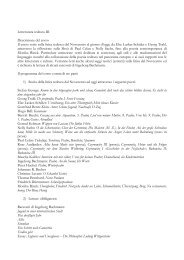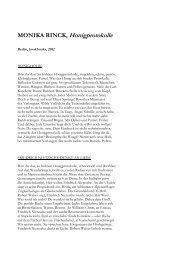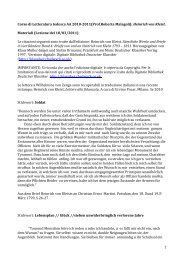The lives of the poets from The Dictionary of National Biography ...
The lives of the poets from The Dictionary of National Biography ...
The lives of the poets from The Dictionary of National Biography ...
Create successful ePaper yourself
Turn your PDF publications into a flip-book with our unique Google optimized e-Paper software.
1.7). In 1820 he left Louth, to be educated at home by his learned, violent, and <strong>of</strong>ten drunken fa<strong>the</strong>r—who<br />
believed in him. ‘My fa<strong>the</strong>r who was a sort <strong>of</strong> Poet himself thought so highly <strong>of</strong> my first essay that he<br />
prophesied I should be <strong>the</strong> greatest Poet <strong>of</strong> <strong>the</strong> Time’ (Trinity Notebook, 34).<br />
Tennyson was to recall ruefully his youthful ambitions and poetical models. It was <strong>the</strong> mouthability <strong>of</strong><br />
poetry, <strong>the</strong> urge to roll it aloud, that drew him.<br />
<strong>The</strong> first poetry that moved me was my own at five years old. When I was eight, I remember making a line<br />
I thought grander than Campbell, or Byron, or Scott. I rolled it out, it was this: ‘With slaughterous sons <strong>of</strong><br />
thunder rolled <strong>the</strong> flood’—great nonsense <strong>of</strong> course, but I thought it fine. (H. Tennyson, Memoir, 2.93)<br />
He was much moved by <strong>the</strong> death <strong>of</strong> Byron in 1824: ‘I was fourteen when I heard <strong>of</strong> his death. It seemed an<br />
awful calamity; I remember I rushed out <strong>of</strong> doors, sat down by myself, shouted aloud, and wrote on <strong>the</strong><br />
sandstone: “Byron is dead!”’ (ibid., 69).<br />
Before I could read, I was in <strong>the</strong> habit on a stormy day <strong>of</strong> spreading my arms to <strong>the</strong> wind, and crying out ‘I<br />
hear a voice thatʹs speaking in <strong>the</strong> wind’, and <strong>the</strong> words ‘far, far away’ had always a strange charm for me.<br />
Tennyson spoke <strong>of</strong> <strong>the</strong> three‐book epic (‘à la Scott’) written in his ‘very earliest teens’. ‘I never felt so<br />
inspired—I used to compose 60 or 70 lines in a breath. I used to shout <strong>the</strong>m about <strong>the</strong> silent fields, leaping<br />
over <strong>the</strong> hedges in my excitement’ (Trinity Notebook, 34; H. Tennyson, Memoir, 1.11–12) .<br />
Tennysonʹs prodigious excitement is evidenced in <strong>the</strong> play he wrote (1823–4) in imitation <strong>of</strong> Elizabethan<br />
comedy, <strong>The</strong> Devil and <strong>the</strong> Lady, a wondrous pastiche, alive in its ambivalent erotic deploring, its vistas <strong>of</strong><br />
space, its anatomizing <strong>of</strong> old age, and its grim humour. Duller, placatingly conventional, <strong>the</strong>re was<br />
published in April 1827, by J. and J. Jackson, booksellers <strong>of</strong> Louth, Poems by Two Bro<strong>the</strong>rs (three bro<strong>the</strong>rs,<br />
since Frederick supplied four poems for this volume by Charles and Alfred); it earned <strong>the</strong>m £20 (more than<br />
half in books) and courteous flat notices in <strong>the</strong> Literary Chronicle (19 May 1827) and <strong>the</strong> Gentlemanʹs<br />
Magazine (June). Tennysonʹs unoriginal contributions were written ‘between 15 and 17’ (1893 reissue <strong>of</strong><br />
1827, quoting Tennyson). Wisely, he did not include any <strong>of</strong> <strong>the</strong>m in later editions <strong>of</strong> his works.<br />
But <strong>the</strong> Lincolnshire <strong>of</strong> Tennysonʹs young days was alive in his late poems, notably those in dialect,<br />
‘wonderful studies in English vernacular life’ as Richard Holt Hutton called <strong>the</strong>m (Hutton, 380). Tennysonʹs<br />
gruff gnarled humour here found its local habitation and intonation, audible in his own recorded reading <strong>of</strong><br />
<strong>the</strong> best <strong>of</strong> <strong>the</strong>m, ‘Nor<strong>the</strong>rn Farmer: New Style’, ‘founded’, as Tennyson said, on a single sentence: ‘When I<br />
canters my ʹerse along <strong>the</strong> ramper [highway] I ʹears “proputty, proputty, proputty”’ (Poems, 2.688).<br />
Cambridge, Arthur Hallam, and early accomplishments<br />
In November 1827 Tennyson entered Trinity College, Cambridge, where Charles had just joined Frederick.<br />
He was unhappy <strong>the</strong>re at first (and <strong>of</strong>ten subsequently—see <strong>the</strong> bitter sonnet that he chose not to publish,<br />
‘Lines on Cambridge <strong>of</strong> 1830’): ‘<strong>The</strong> country is so disgustingly level, <strong>the</strong> revelry <strong>of</strong> <strong>the</strong> place so monotonous,<br />
<strong>the</strong> studies <strong>of</strong> <strong>the</strong> University so uninteresting, so much matter <strong>of</strong> fact—none but dryheaded calculating<br />
angular little gentlemen can take much delight’ in algebraic formulae (18 April 1828, Letters, 1.23). But<br />
fortunately he came to know some well‐rounded larger gentlemen, foremost among <strong>the</strong>m Arthur Henry<br />
Hallam (1811–1833) [see under Hallam, Henry (1777–1859)], whom Tennyson met about April 1829. Hallam<br />
had entered Trinity College <strong>the</strong> previous October. <strong>The</strong> friendship, deepening into love, <strong>of</strong> Hallam and<br />
Tennyson was to be one <strong>of</strong> <strong>the</strong> most important experiences <strong>of</strong> Hallamʹs short life and <strong>of</strong> Tennysonʹs long one.<br />
A fur<strong>the</strong>r flowering at Cambridge: in October 1829 Tennyson was elected a member <strong>of</strong> <strong>the</strong> Apostles, an<br />
informal debating society to which most <strong>of</strong> his Cambridge friends belonged (such eminent, though not pre‐<br />
eminent, Victorians as John Kemble, Richard Chenevix Trench, Richard Monckton Milnes, and James<br />
Spedding). <strong>The</strong>n in June 1829 he won <strong>the</strong> chancellorʹs gold medal with his prize poem on <strong>the</strong> set subject<br />
Timbuctoo. Reworking an earlier poem (as he was so <strong>of</strong>ten to do with consummate re‐creative imagination),


